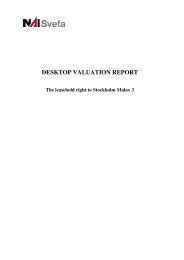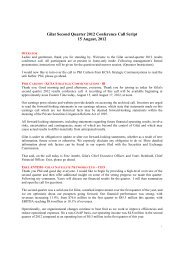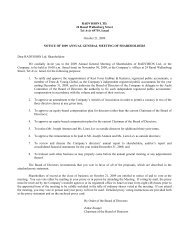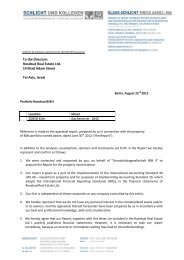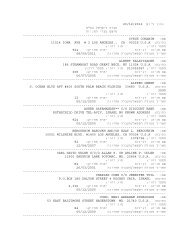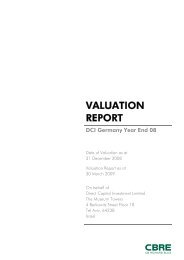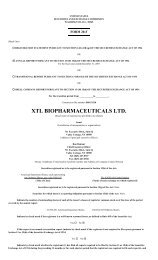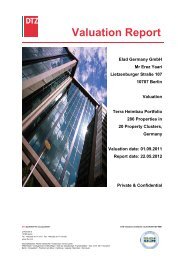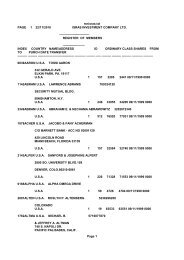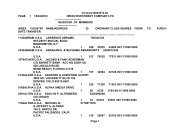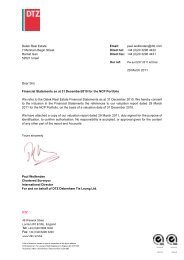RETALIX LTD.
RETALIX LTD.
RETALIX LTD.
You also want an ePaper? Increase the reach of your titles
YUMPU automatically turns print PDFs into web optimized ePapers that Google loves.
The dollar cost of our operations in Israel will increase to the extent increases in the rate of inflation in Israel are not offset by a devaluation of<br />
the NIS in relation to the dollar, which would harm our results of operations.<br />
Since a considerable portion of our expenses such as employees’ salaries are linked to an extent to the rate of inflation in Israel, the dollar cost of our<br />
operations is influenced by the extent to which any increase in the rate of inflation in Israel is or is not offset by the devaluation of the NIS in relation to the<br />
dollar. As a result, we are exposed to the risk that the NIS, after adjustment for inflation in Israel, will appreciate in relation to the dollar. In that event, the<br />
dollar cost of our operations in Israel will increase and our dollar-measured results of operations will be adversely affected. In 2001 and 2002, the inflation<br />
adjusted NIS devalued against the dollar, which lowered the dollar cost of our Israeli operations. During 2003, 2004 and 2005, however, the inflation<br />
adjusted NIS appreciated against the dollar, which raised the dollar cost of our Israeli operations. We cannot predict whether in the future the NIS will<br />
appreciate against the dollar or vice versa. Any increase in the rate of inflation in Israel, unless the increase is offset on a timely basis by a devaluation of<br />
the NIS in relation to the dollar, will increase labor and other costs, which will increase the dollar cost of our operations in Israel and harm our results of<br />
operations.<br />
We currently participate in or receive tax benefits from government programs. These programs require us to meet certain conditions and these<br />
programs and benefits could be terminated or reduced in the future, which could harm our results of operations.<br />
We receive tax benefits under the Israeli Law for Encouragement of Capital Investments, 1959, or the Investments Law, with respect to our production<br />
facilities that are designated as “Approved Enterprises”. We believe that we are currently in compliance with these requirements. However, if we fail to<br />
meet these requirements, we would be subject to corporate tax in Israel at the regular statutory rate. We could also be required to refund tax benefits, with<br />
interest and adjustments for inflation based on the Israeli consumer price index. Our tax benefits resulting from our Approved Enterprises for the years<br />
2003, 2004 and 2005, net of other tax effects, were approximately $365,000, $355,000 and $2,518,000 respectively. In addition, an increase in our<br />
manufacturing outside of Israel may be construed as a failure to comply with the Investments Law conditions. There can be no assurance that new benefits<br />
will be available, or that existing benefits will be continued in the future, at their current level or at any level.<br />
Our board of directors has determined that we will not distribute any amounts of our undistributed tax exempt income as a dividend. We intend to<br />
reinvest our tax-exempt income and not to distribute such income as a dividend. Accordingly, no deferred income taxes have been provided on income<br />
attributable to our Approved Enterprise programs as the undistributed tax exempt income is essentially permanent in duration.<br />
On April 1, 2005, an amendment to the Investments Law came into effect, which revised the criteria for investments qualified to receive tax benefits. .<br />
An eligible investment program under the amendment will qualify for benefits as a Privileged Enterprise (rather than the previous terminology of<br />
Approved Enterprise). Among other things, the amendment provides tax benefits to both local and foreign investors and simplifies the approval process.<br />
The amendment does not apply to investment programs approved prior to December 31, 2004.<br />
As a result of the amendment, tax-exempt income generated under the provisions of the new law will subject us to taxes upon distribution or liquidation<br />
and we may be required to record deferred tax liability with respect to such tax-exempt income. We are currently evaluating the impact the amendment will<br />
have on us. This may materially increase our provision for income taxes in 2006 and subsequent years.<br />
Because we have received grants from the Office of the Chief Scientist, we are subject to ongoing restrictions that limit the transferability of<br />
our technology and of our right to manufacture outside of Israel, and certain of our large shareholders are required to undertake to observe such<br />
restrictions.<br />
We have received royalty-bearing grants from the Office of the Chief Scientist, or OCS, of the Ministry of Industry, Trade and Labor of the<br />
Government of Israel in an aggregate amount of approximately $4,300,000 through December 31, 2005. We must pay royalties to the OCS on the revenue<br />
derived from the sale of products and technologies, and related services, developed with the grants from the OCS. The OCS budget has been subject to<br />
reductions, which may affect the availability of funds for grants in the future. As a result, we cannot be certain that we will continue to receive grants at the<br />
same rate, or at all. In addition, the terms of any future grant may be less favorable than our past grant. According to Israeli law, any products developed<br />
with grants from the OCS are usually required to be manufactured in Israel, unless we obtain prior approval of a governmental committee. As a condition<br />
to obtaining this approval, we may be required to pay the OCS up to 300% of the grants we received and to repay such grants at a quicker rate. In addition,<br />
we are prohibited from transferring to third parties the technology developed with these grants without the prior approval of a governmental committee.<br />
Any non-Israeli who becomes a direct holder of 5% or more of our outstanding ordinary shares will be required to notify the OCS and to undertake to<br />
observe the law governing the grant programs of the OCS, the principal restrictions of which are the transferability limits described above in this<br />
paragraph.<br />
In order to meet specified conditions in connection with the grants and programs of the OCS, we have made representations to the Government of Israel<br />
about our Israeli operations. If we fail to meet the conditions related to the grants, including the maintenance of a material presence in Israel, or if there is<br />
any material deviation from the representations made by us to the Israeli government, we would be required to refund the grants previously received<br />
(together with an adjustment based on the Israeli consumer price index and an interest factor) and would likely be ineligible to receive OCS grants in the<br />
future. The inability to receive these grants would result in an increase in our research and development expenses.<br />
Under current Israeli law, we may not be able to enforce covenants not to compete and therefore may be unable to prevent our competitors<br />
from benefiting from the expertise of some of our former employees.<br />
Israeli courts have required employers seeking to enforce non-compete undertakings against former employees to demonstrate that the former employee<br />
breached an obligation to the employer and thereby caused harm to one of a limited number of legitimate interests of the employer recognized by the<br />
courts, such as the confidentiality of certain commercial information or a company’s intellectual property. We currently have non-competition clauses in<br />
the employment agreements of most of our employees. The provisions of such clauses prohibit our employees, if they cease working for us, from directly<br />
competing with us or working for our competitors. In the event that any of our employees chooses to work for one of our competitors, we may be unable to<br />
prevent that competitor from benefiting from the expertise such former employee obtained from us, if we cannot demonstrate to the court that such former




